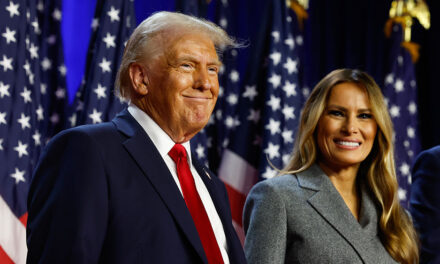We support our Publishers and Content Creators. You can view this story on their website by CLICKING HERE.
Trump demanding NATO members spend 5% of GDP on defense – may impose TARIFFS on allies that do not pay up
- President-elect Donald Trump wants NATO members to increase their defense spending to at least five percent of GDP.
- NATO allies are already in agreement about increasing defense spending to at least three percent of GDP by 2025, and may be willing to increase that goal to 3.5 percent of GDP.
- European allies have expressed concerns regarding the fiscal challenges of meeting higher defense spending targets.
- Trump could impose targeted tariffs on NATO allies that are not working towards meeting defense spending goals.
The incoming administration of President-elect Donald Trump has signaled a shift in its foreign policy approach toward Europe and Ukraine, emphasizing the need for North Atlantic Treaty Organization (NATO) member states to increase their defense spending while maintaining military aid to Kyiv.
This marks a departure from Trump’s previous statements on the campaign trail, which included threats to cut aid to Ukraine and withdraw American support for NATO allies that failed to meet defense spending targets. (Related: U.K., France plotting to stop Trump peace deal by pledging to send troops to Ukraine.)
According to sources familiar with discussions between Trump’s foreign policy aides and senior European officials, the president-elect intends to demand that NATO member states raise their defense spending to five percent of GDP. However, some officials suggest that Trump may settle for a target of 3.5 percent, explicitly linking higher defense spending to more favorable trading terms with the United States.
The incoming Trump administration may be willing to impose tariffs on NATO allies that are not working towards meeting either goal. These tariffs could focus on consumer goods like luxury goods to not disrupt important U.S. supply chains.
This demand comes as NATO allies are already considering increasing their spending target to three percent at the alliance’s June 2025 summit in The Hague.
The U.S. currently plans to spend approximately 3.1 percent of GDP on defense in 2024, a figure that aligns with Trump’s proposed target. During his previous presidency, Pentagon spending peaked at 3.4 percent of GDP in 2020.
European allies, including France, Germany, the United Kingdom, Italy and Poland, have expressed concerns about the fiscal challenges associated with meeting higher defense spending targets.
Trump now open to providing Ukraine with limited military aid
In a significant reversal from his earlier stance, Trump now plans to continue supplying military aid to Ukraine after his inauguration. This decision is seen as a boost for European allies, who have expressed deep concern over their ability to support Ukraine without U.S. backing.
During his campaign, Trump had vowed to cut off aid to Ukraine and force immediate peace talks, a position that alarmed European capitals.
Trump’s team has also indicated that while he opposes Ukraine’s NATO membership and seeks an immediate end to the conflict, he believes supplying weapons to Kyiv after a ceasefire would ensure a “peace through strength” outcome. This approach aligns with his broader strategy of leveraging U.S. military aid to bolster Ukraine’s defenses.
European leaders have responded to Trump’s policy shifts with cautious optimism. German Chancellor Olaf Scholz, who spoke with Trump during a recent European Union summit, expressed confidence that the U.S. and Europe would continue their support for Ukraine.
Meanwhile, NATO Secretary-General Mark Rutte has warned that the West is “not ready” for an increasing Russian threat over the next five years, emphasizing the need for heightened defense preparedness.
Rutte has praised Trump’s previous presidency for encouraging NATO countries to increase their defense expenditures, and he has called for further increases to address the evolving threat from Russia.
Many NATO members, including Italy, Spain, Portugal, Belgium, Luxembourg, Slovenia, Croatia and Canada, currently spend less than two percent of GDP on defense, while the U.S., Poland, and the Baltic states spend over three percent.
Watch this clip from InfoWars as Alex Jones discusses how NATO has already decided that it needs to go to war with Russia.
This video is from the InfoWars channel on Brighteon.com.
More related stories:
Ukraine pushes for NATO membership as lawmaker calls for NUKES.
Zelensky willing to sign peace deal with Russia in exchange for NATO membership.
NATO’s direct involvement in Russia-Ukraine conflict could easily escalate into a NUCLEAR WAR.
NATO draws up plans to deploy 800,000 troops through Germany to fight Russia.
Sources include:

 Conservative
Conservative  Search
Search Trending
Trending Current News
Current News 





